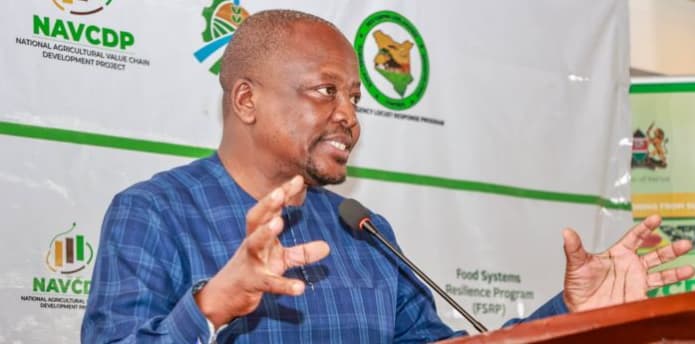We're loading the full news article for you. This includes the article content, images, author information, and related articles.
Agriculture Cabinet Secretary Mutahi Kagwe has cautioned of a severe rice shortage after the High Court temporarily halted the government’s plan to import 500,000 metric tonnes of duty-free rice.

Nairobi, August 15, 2025 — Agriculture Cabinet Secretary Mutahi Kagwe has cautioned of a severe rice shortage after the High Court temporarily halted the government’s plan to import 500,000 metric tonnes of duty-free rice.
On August 11, 2025, Justice Edward Muriithi of the High Court in Kerugoya issued a conservatory order suspending the Gazette Notice—dated July 28—authorising the duty-free import until December 31, 2025. The action came in response to a petition filed by the Farmers Party, which claimed the move bypassed required public participation and threatened local rice farmers.
A hearing was scheduled for August 14, with further court directions expected on August 15.
In a replying affidavit, CS Kagwe warned that local rice stocks stood at only 20,000 (50 kg) bags, drastically short of the projected 350,000 bags needed by key institutions like schools, hospitals, prisons, and military units.
He noted that Kenya’s annual rice demand is about 1.3 million metric tonnes, translating to a national requirement of 1.5 million tonnes in 2025—approximately 125,000 tonnes per month.
CS Kagwe warned that blocking the imports would likely cause soaring rice prices—currently between Ksh 190 and Ksh 220 per kilogram, up from Ksh 150/kg last year—and disrupt supply chains for essential goods such as maize flour and wheat products.
He stressed that over 95% of the rice to be imported is non-basmati, targeting price-sensitive markets and not competing with local pishori rice.
Farmers Party: Claims the import threatens livelihoods, violates farmers’ rights to property and fair competition, and lacked public consultation—arguing the move misused EAC Customs Management Act provisions.
Government Position: Maintains that importing rice is a longstanding policy rooted in food security strategy, and that the Ministry continues to procure local rice via the Kenya National Trading Corporation (KNTC) to support domestic producers.
|
Aspect |
Details |
|---|---|
|
Court Action |
High Court suspends import of 500,000 MT rice pending petition hearing |
|
Local Stock vs. Demand |
20,000 bags in stock vs. 350,000 needed for institutions |
|
National Rice Requirement |
Approx. 1.5 million MT in 2025 (125,000 MT/month) |
|
Price Impact |
Retail prices rose to Ksh 190–220/kg |
|
Import Composition |
Over 95% of imports are non-basmati—does not compete with local pishori |
|
Debate Focus |
Food security vs. protection of local producers & consultation rights |
This dispute highlights Kenya’s delicate balance between ensuring food security and safeguarding local agriculture. With climate pressures and continued demand growth, imports are necessary—but so is the protection of local farming communities and transparent policymaking.
Keep the conversation in one place—threads here stay linked to the story and in the forums.
Sign in to start a discussion
Start a conversation about this story and keep it linked here.
Other hot threads
E-sports and Gaming Community in Kenya
Active 9 months ago
The Role of Technology in Modern Agriculture (AgriTech)
Active 9 months ago
Popular Recreational Activities Across Counties
Active 9 months ago
Investing in Youth Sports Development Programs
Active 9 months ago
Key figures and persons of interest featured in this article